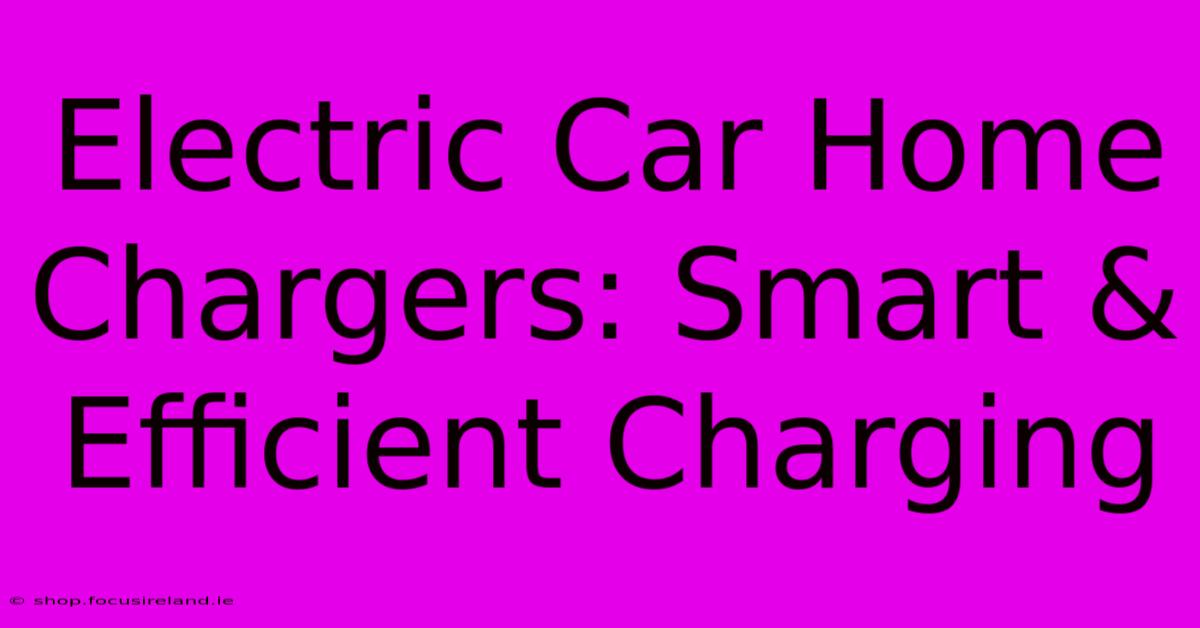Electric Car Home Chargers: Smart & Efficient Charging

Table of Contents
Electric Car Home Chargers: Smart & Efficient Charging
The rise of electric vehicles (EVs) is transforming the automotive landscape, and with it comes the crucial need for reliable and efficient home charging solutions. Choosing the right electric car home charger can significantly impact your charging experience, energy costs, and overall convenience. This guide explores the world of smart EV home chargers, helping you make an informed decision for your electric vehicle needs.
Understanding Your Electric Car Charging Needs
Before diving into specific chargers, consider your individual requirements:
- Vehicle Compatibility: Ensure the charger is compatible with your EV's charging connector type (e.g., Type 1, Type 2, Tesla connector). Check your car's manual for specifics.
- Charging Speed: Charging speeds are measured in kilowatts (kW). Higher kW chargers deliver faster charging times, but this often translates to a higher initial investment. Consider your typical daily driving habits to determine the appropriate charging speed.
- Amperage: The amperage (measured in amps) determines the power draw from your home's electrical system. Higher amperage means faster charging but might require an electrical panel upgrade. Consult a qualified electrician to assess your home's capacity.
- Smart Features: Many modern chargers offer smart features like scheduling, energy monitoring, and integration with home energy management systems. These features optimize charging times and potentially reduce energy costs.
Types of Electric Car Home Chargers
The market offers various home EV chargers, each with its own set of advantages:
Level 1 Chargers:
- Description: These are the simplest chargers, typically using a standard household outlet (120V in North America, 230V in Europe).
- Charging Speed: The slowest option, suitable only for overnight charging or infrequent use.
- Pros: Inexpensive, requires no special installation.
- Cons: Very slow charging times, not ideal for daily commutes.
Level 2 Chargers:
- Description: These chargers require a dedicated circuit and typically operate at 240V, significantly faster than Level 1 chargers.
- Charging Speed: Substantially faster than Level 1, ideal for daily charging. kW ratings vary widely.
- Pros: Much faster charging, better for regular use.
- Cons: Requires professional installation, higher initial cost.
Smart Home Chargers:
- Description: These Level 2 chargers incorporate smart features like Wi-Fi connectivity, energy monitoring, and scheduling capabilities.
- Charging Speed: Charging speeds vary based on kW rating, but they usually offer faster charging than Level 1 chargers.
- Pros: Optimize charging times, energy management, remote monitoring, potentially lower energy bills.
- Cons: Higher initial cost than standard Level 2 chargers.
Choosing the Right Smart EV Home Charger
Selecting the optimal charger involves balancing cost, speed, and smart features. Consider:
- Your budget: Set a realistic budget considering installation costs.
- Your daily driving needs: Determine the charging speed required to meet your daily commute and usage patterns.
- Smart features: Prioritize the features that align with your needs and preferences.
- Professional installation: Always have a qualified electrician install your Level 2 charger to ensure safety and compliance with electrical codes.
Maximizing Efficiency with Smart Charging Features
Smart chargers provide numerous benefits beyond speed:
- Scheduled Charging: Charge your EV during off-peak hours when electricity rates are lower, saving you money.
- Energy Monitoring: Track your energy consumption and identify opportunities for further optimization.
- Load Management: Smart chargers can work with your home's energy management system to prioritize charging based on overall energy consumption.
- Remote Monitoring & Control: Check your charging status and manage charging schedules remotely using a smartphone app.
Installation & Safety Considerations
- Electrical Panel Upgrade: Higher-amperage chargers may require an upgrade to your home's electrical panel.
- Professional Installation: Always use a qualified electrician to ensure safe and code-compliant installation.
- Safety Precautions: Never attempt to install or repair an EV charger yourself unless you are a qualified electrician.
Conclusion
Investing in a smart and efficient electric car home charger is a crucial step for any EV owner. By carefully considering your individual needs and the available options, you can choose a charger that optimizes your charging experience, minimizes energy costs, and enhances your overall EV ownership. Remember to prioritize safety and consult with a qualified electrician throughout the process.

Thank you for visiting our website wich cover about Electric Car Home Chargers: Smart & Efficient Charging. We hope the information provided has been useful to you. Feel free to contact us if you have any questions or need further assistance. See you next time and dont miss to bookmark.
Featured Posts
-
San Francisco To Dublin Avoid These Flight Time Traps
Mar 29, 2025
-
Unwrap Ennis Your Co Clare Map To Unforgettable Adventures
Mar 29, 2025
-
Dublin Nye A Toast To The New Year
Mar 29, 2025
-
Electric Car Home Chargers Smart And Efficient Charging
Mar 29, 2025
-
Ireland Crossword Clue A Locals Insight
Mar 29, 2025
